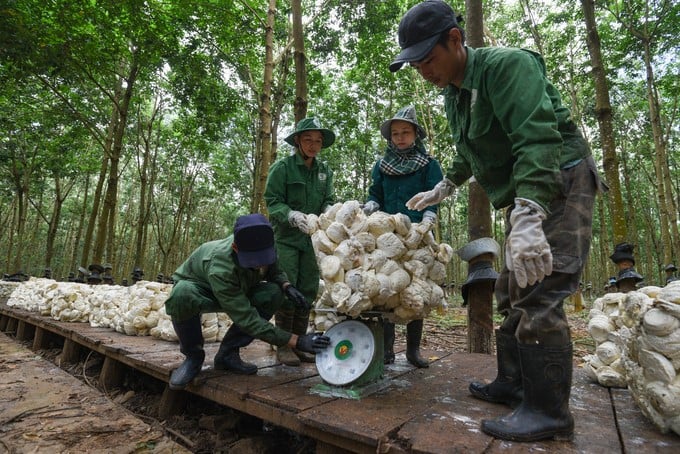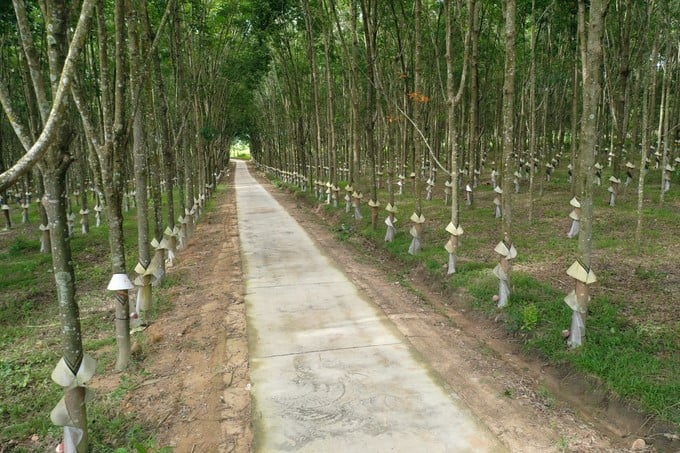November 22, 2025 | 22:24 GMT +7
November 22, 2025 | 22:24 GMT +7
Hotline: 0913.378.918
November 22, 2025 | 22:24 GMT +7
Hotline: 0913.378.918

Vietnam Rubber Group clearly defines its viewpoint on green growth and sustainable development. Photo: Tung Dinh.
According to Mr. Le Thanh Hung, General Director of Vietnam Rubber Group (VRG), the Group always determines its pioneering and typical role in developing the rubber industry sustainably. The Green Growth and Sustainable Development Strategy is one of the Group's important guidelines to simultaneously implement three goals: economic development, environmental protection, and responsibility towards the community and society.
Accordingly, the strategy was built to meet the sustainable development trend of Vietnam and the world, contributing directly to reducing greenhouse gas emissions towards a long-term carbon-neutral economy.
During the construction process, the strategy is people-centered and committed to implementing responsibilities towards the community and society, harmonizing the interests of businesses and people.
The strategy focuses on promoting the implementation of national and international certifications on sustainable development towards the goal of the business committing to sustainable supply, having transparent traceability policies, and improving business standards for international integration.
The Group also defines its strategy of orienting investment in advanced technology, digital transformation, enhancing the circular economy, using renewable energy, applying cleaner production solutions, and constantly improving the governance system in accordance with domestic conditions and the international context.

Implementing green growth goals for rubber is an important factor in meeting the requirements of major markets in the coming time, including EU's EUDR regulation. Photo: Tung Dinh.
These are extremely important factors in the context of the EU Deforestation-free Regulation (EUDR) about to take effect, with seven product groups selected for implementation, including palm oil, soybeans, wood, cattle, cocoa, coffee, rubber, and some products derived from there.
Through the Green Growth and Sustainable Development Strategy, VRG sets a target of absolutely complying with the national strategy on green growth for the period 2021–2030, with a vision to 2050 to achieve economic growth, environmental sustainability, and social justice, contributing to building a low-carbon economy, reducing emissions, and increasing the ability to absorb greenhouse gases.
Specifically, the target by 2030 is to reduce greenhouse gas emissions in energy activities by at least 15% compared to 2023. And by 2050, reduce greenhouse gas emissions in energy activities by at least 30% compared to 2023.
From there, it is possible to meet the increasingly high and demanding requirements of customers, especially the requirements of tire manufacturers, wood processers, industrial rubber producers, etc., as well as meet policies to only purchase natural rubber from companies committed to ensuring sustainability throughout the entire supply chain.
VRG continues to implement national and international certifications on sustainable development towards the goal of the business committing to sustainable supply, having transparent traceability policies, completing the governance system, and improving business standards for international integration.
At the same time, the Group requires supply partners to apply green growth and sustainable development processes in production and trading activities to synchronize the goal of green growth in the supply chain.

VRG sets a goal that by 2050, 100% of rubber areas and production forests will be certified for national and international sustainable forest management. Photo: Tung Dinh.
Regarding the supply chain, the Group sets a goal that by 2030, 60% of rubber areas and production forests will achieve national and international sustainable forest management certifications (VFCS, PEFC, FSC, etc.), and 100% of latex processing factories will achieve the chain of custody certificate.
By 2050, 100% of rubber areas and production forests will be certified for national and international sustainable forest management (VFCS, PEFC, FSC, etc.) and 100% of manufacturing factories (latex, wood, rubber industrial products, etc.) will have a chain of custody certificate.
In addition, depending on the actual situation and future market needs, the Group will research and implement certifications for green growth and sustainable development in accordance with domestic conditions and the international context to promote competitive advantages.
Continuously update and perfect management systems, improve production efficiency, and promote corporate social responsibility through national and international standard systems.
Ready from the grassroots level
EUDR’s regulations directly affect seven product groups exported to Europe, including rubber. Recognizing this problem early, right from the moment the European Commission (EC) proposed EUDR in mid-November 2021, the Ministry of Agriculture and Rural Development (MARD) and Vietnam Rubber Group (VRG) directed relevant units to focus on monitoring and controlling the growing area to avoid deforestation and forest degradation.
Based on this orientation, Ea H'leo Rubber Co., Ltd. (Dak Lak) initially implemented positive measures in growing areas located in remote areas. In 2022, the company completed its FSC-CoC certificate. This is an FSC-Chain of Custody certificate, proving that businesses meet standards for production, processing, trading, etc. of products originating from forests.
Mr. Le Anh Tuan, Director of Ea H'leo Rubber Company, said the company has offered three main solutions. First, strive to increase rubber-growing areas that achieve sustainable forest management certifications such as FSC, PEFC, etc. Due to its characteristics of being beautiful and white and being able to make high-end furniture, rubber wood can increase its value by 20% if it has FSC. Accordingly, the price of latex will also increase.
Second, coordinate more closely with local authorities, specifically the Dak Lak Provincial People's Committee and the Ea H'leo District People's Committee. On this basis, the Ea H’leo company will strengthen risk management related to aspects of complying with and harmonizing interests for indigenous people in all stages of the supply chain.
Finally, the business wants to participate more deeply in high-tech agricultural production activities. This is also the orientation of Ea H'leo district in its goal of making the area the province’s main growth motivation at the northern gateway.
From a local perspective, Mr. Nguyen Van Ha, Deputy Secretary and Chairman of the Ea H'Leo District People's Committee, said that the locality has very good spare ground for agricultural development, especially industrial crops, because of its about 80,000 hectares of red basaltic soil.
"Recently, when Europe issued a new regulation on agricultural products related to deforestation or forest encroachment (EUDR), the locality grasped and organized strong dissemination for farmers as well as other purchasing and processing enterprises," said Mr. Nguyen Van Ha.
Specifically, the district recommended that purchasing companies not accept agricultural products originating from forest land. However, to help farmers feel secure in production, Ea H'Leo district also had a solution to ensure this new EU’s regulation.
Translated by Huyen Vu Thu

(VAN) Results from the Sustainable Durian Model Project in Dak Lak have confirmed the critical role of Yara Viet Nam in transferring advanced nutritional solutions to farmers.

(VAN) In Tuyen Quang province, livestock farmers have introduced effective models and innovative practices that significantly strengthen African Swine Fever prevention and control efforts.

(VAN) This is the study conducted by IRRI and Can Tho University on the rice straw value chain in Mekong Delta showing an economic potential of more than 6.6 trillion VND/year.

(VAN) By participating in cooperative economics, many farmers in Tay Ninh have overcome hardship, mastered clean dragon fruit cultivation techniques.

(VAN) The crossbreeding program in the former Binh Dinh province (now part of Gia Lai) has shown signs of decline, and urgent measures are needed to revive it and sustain past achievements.

(VAN) The agricultural sector agreed on a roadmap to pilot the MRV protocol and expand low-emission rice production from the 2025-2026 winter-spring crop.

(VAN) Agricultural extension officers in Quang Ninh do more than transmit knowledge; they have become a steadfast support system for farmers on the path to sustainable agricultural development.